Hyundai IONIQ 5 vs VW Tayron – Differences & prices compared
Two cars, one duel: Hyundai IONIQ 5 meets VW Tayron.
Which one wins in performance, efficiency and value for money? Find out now!
Here’s where it gets real: The technical differences in detail
Costs and Efficiency: Looking at overall running costs, both models reveal some interesting differences in everyday economy.
Hyundai IONIQ 5 has a barely noticeable advantage in terms of price – it starts at 38500 £, while the VW Tayron costs 39000 £. That’s a price difference of around 493 £.
As for range, the Hyundai IONIQ 5 performs clearly better – achieving up to 570 km, about 444 km more than the VW Tayron.
Engine and Performance: Under the bonnet, it becomes clear which model is tuned for sportiness and which one takes the lead when you hit the accelerator.
When it comes to engine power, the Hyundai IONIQ 5 has a convincingly edge – offering 650 HP compared to 272 HP. That’s roughly 378 HP more horsepower.
In acceleration from 0 to 100 km/h, the Hyundai IONIQ 5 is clearly quicker – completing the sprint in 3.50 s, while the VW Tayron takes 6.10 s. That’s about 2.60 s faster.
In terms of top speed, the Hyundai IONIQ 5 performs minimal better – reaching 260 km/h, while the VW Tayron tops out at 240 km/h. The difference is around 20 km/h.
There’s also a difference in torque: the Hyundai IONIQ 5 pulls decisively stronger with 770 Nm compared to 400 Nm. That’s about 370 Nm difference.
Space and Everyday Use: Whether family car or daily driver – which one offers more room, flexibility and comfort?
Both vehicles offer seating for 5 people.
In curb weight, the VW Tayron is slightly lighter – 1682 kg compared to 1955 kg. The difference is around 273 kg.
In terms of boot space, the VW Tayron offers clearly more room – 885 L compared to 520 L. That’s a difference of about 365 L.
In maximum load capacity, the VW Tayron performs clearly perceptible better – up to 2090 L, which is about 510 L more than the Hyundai IONIQ 5.
When it comes to payload, VW Tayron slight takes the win – 566 kg compared to 530 kg. That’s a difference of about 36 kg.
All in all, the Hyundai IONIQ 5 shows itself to be wins the duel decisively and secures the title of DriveDuel Champion.
It impresses with the more balanced overall package and proves to be the more versatile companion for everyday use.
Hyundai IONIQ 5
The Hyundai IONIQ 5 showcases a bold and futuristic design that captures attention with its striking facade and sharp lines. This electric vehicle offers an impressive blend of performance and efficiency, making it a compelling choice for environmentally conscious drivers. Inside, the spacious and tech-forward interior provides a comfortable and engaging driving experience for both driver and passengers.
details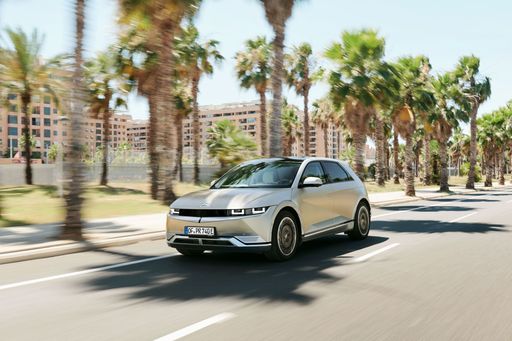 @ hyundai.news
@ hyundai.news
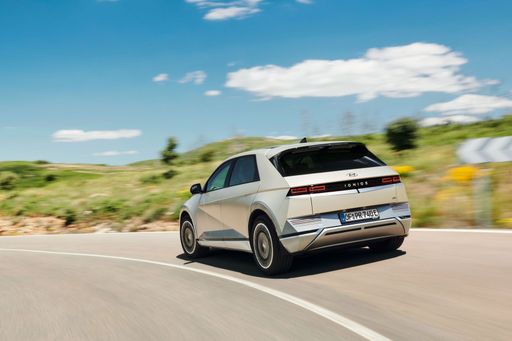 @ hyundai.news
@ hyundai.news
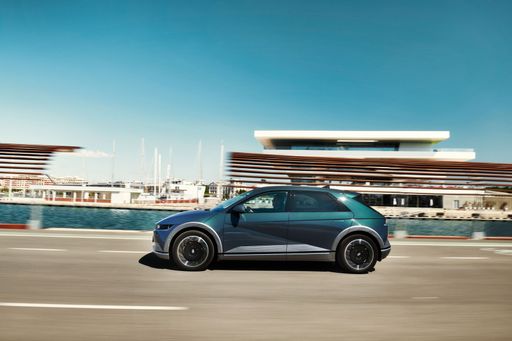 @ hyundai.news
@ hyundai.news
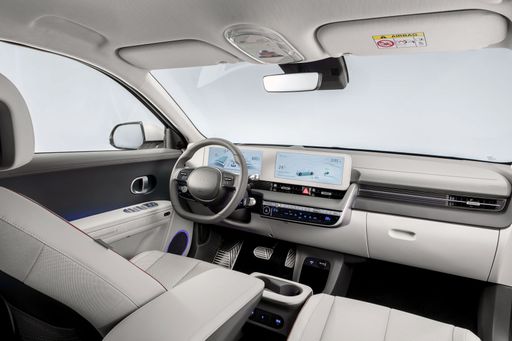 @ hyundai.news
@ hyundai.news
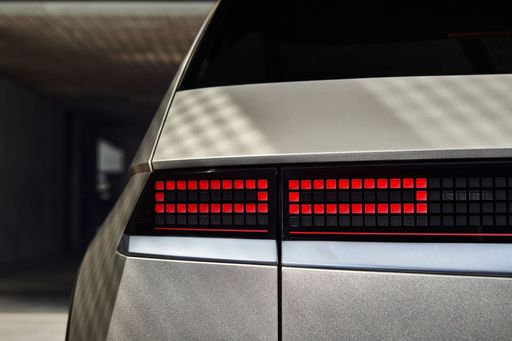 @ hyundai.news
@ hyundai.news
VW Tayron
The Tayron stands out as a stylish and versatile SUV that expertly blends form and function. With its spacious interior and modern design, it caters to families and adventure seekers alike, making every journey enjoyable. Equipped with advanced technology and safety features, the Tayron promises a driving experience that is both secure and exhilarating.
details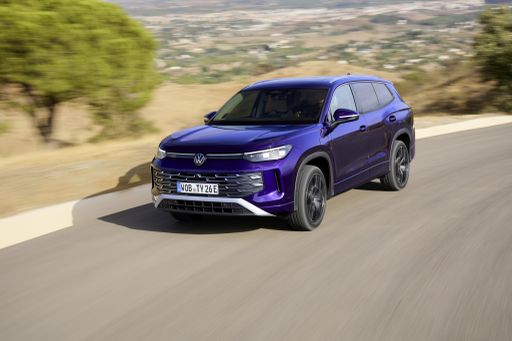 @ volkswagen-newsroom.com
@ volkswagen-newsroom.com
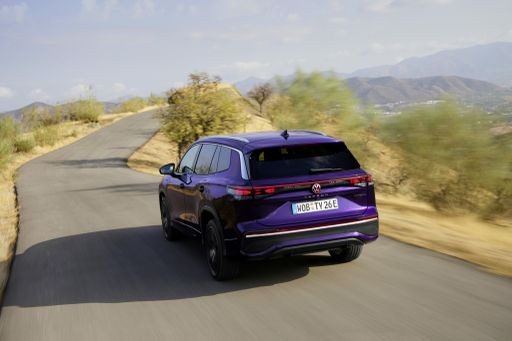 @ volkswagen-newsroom.com
@ volkswagen-newsroom.com
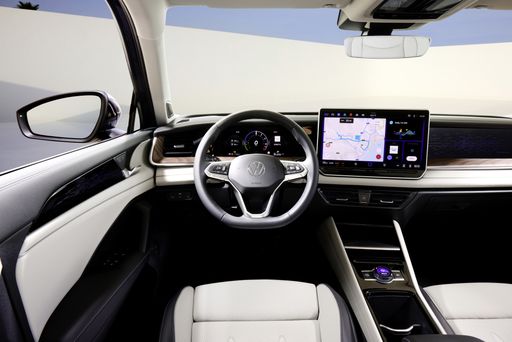 @ volkswagen-newsroom.com
@ volkswagen-newsroom.com
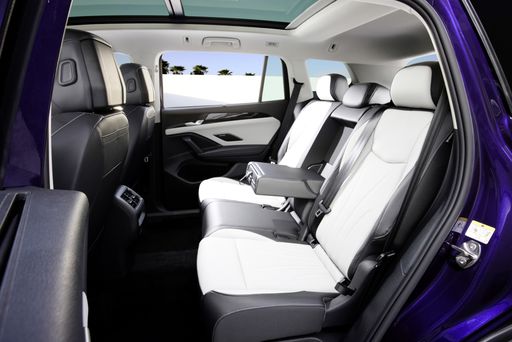 @ volkswagen-newsroom.com
@ volkswagen-newsroom.com

|

|
|
|
|
Costs and Consumption |
|
|---|---|
|
Price
38500 - 64200 £
|
Price
39000 - 52600 £
|
|
Consumption L/100km
-
|
Consumption L/100km
0.4 - 8.5 L
|
|
Consumption kWh/100km
15.6 - 21.2 kWh
|
Consumption kWh/100km
-
|
|
Electric Range
440 - 570 km
|
Electric Range
117 - 126 km
|
|
Battery Capacity
63 - 84 kWh
|
Battery Capacity
19.70 kWh
|
|
co2
0 g/km
|
co2
9 - 192 g/km
|
|
Fuel tank capacity
-
|
Fuel tank capacity
45 - 58 L
|
Dimensions and Body |
|
|---|---|
|
Body Type
SUV
|
Body Type
SUV
|
|
Seats
5
|
Seats
5
|
|
Doors
5
|
Doors
5
|
|
Curb weight
1955 - 2275 kg
|
Curb weight
1682 - 1948 kg
|
|
Trunk capacity
480 - 520 L
|
Trunk capacity
705 - 885 L
|
|
Length
4655 - 4715 mm
|
Length
4792 mm
|
|
Width
1890 - 1940 mm
|
Width
1853 - 1866 mm
|
|
Height
1585 - 1605 mm
|
Height
1666 - 1668 mm
|
|
Max trunk capacity
1540 - 1580 L
|
Max trunk capacity
1915 - 2090 L
|
|
Payload
385 - 530 kg
|
Payload
489 - 566 kg
|
Engine and Performance |
|
|---|---|
|
Engine Type
Electric
|
Engine Type
Petrol MHEV, Plugin Hybrid, Diesel, Petrol
|
|
Transmission
Automatic
|
Transmission
Automatic
|
|
Transmission Detail
Reduction Gearbox
|
Transmission Detail
Dual-Clutch Automatic
|
|
Drive Type
Rear-Wheel Drive, All-Wheel Drive
|
Drive Type
Front-Wheel Drive, All-Wheel Drive
|
|
Power HP
170 - 650 HP
|
Power HP
150 - 272 HP
|
|
Acceleration 0-100km/h
3.5 - 8.5 s
|
Acceleration 0-100km/h
6.1 - 9.7 s
|
|
Max Speed
185 - 260 km/h
|
Max Speed
204 - 240 km/h
|
|
Torque
350 - 770 Nm
|
Torque
250 - 400 Nm
|
|
Number of Cylinders
-
|
Number of Cylinders
4
|
|
Power kW
125 - 478 kW
|
Power kW
110 - 200 kW
|
|
Engine capacity
-
|
Engine capacity
1498 - 1984 cm3
|
General |
|
|---|---|
|
Model Year
2024
|
Model Year
2025
|
|
CO2 Efficiency Class
A
|
CO2 Efficiency Class
E, B, F, G
|
|
Brand
Hyundai
|
Brand
VW
|
What drive types are available for the Hyundai IONIQ 5?
The Hyundai IONIQ 5 is available as Rear-Wheel Drive or All-Wheel Drive.
The prices and data displayed are estimates based on German list prices and may vary by country. This information is not legally binding.
